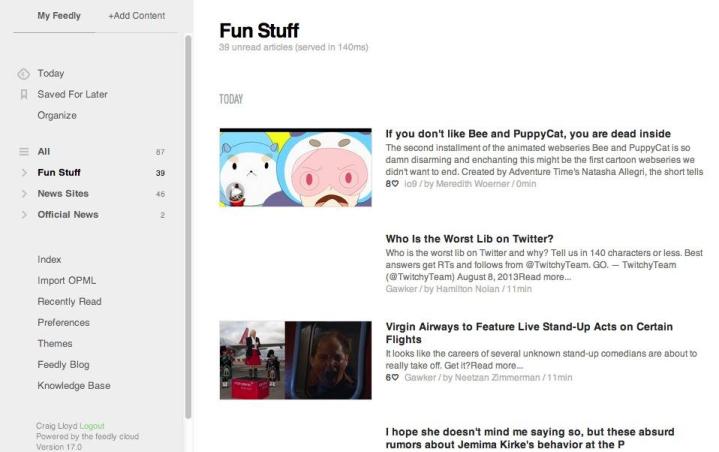It can be tough to keep up with what’s happening online. You might even try several different ways, including visiting specific websites every day, doing Google searches, or relying on social media timelines and news feeds to keep yourself informed. But another solution that sometimes gets overlooked is an old-school one: The RSS feed.
What is an RSS feed? It’s a technology that has influenced many modern internet tools you’re familiar with, and its streamlined, algorithm-free format could make it your next great tool for reading what you want online.
What is RSS?
What RSS stands for depends on who you ask. The main consensus is that it stands for “Really Simple Syndication.” But you may also hear that it stands for “Rich Site Summary.” At its heart though, RSS essentially refers to simple text files with necessary, updated information — news pieces, articles, that sort of thing. That stripped-down content gets plugged into a feed reader, an interface that quickly converts the RSS text files into a stream of the latest updates from around the web.
As internet content became more complex, so did RSS files, quickly adopting images, video, and more, but still in a stripped-down format for more effortless loading and compatibility across all feed readers. Readers usually automatically update to deliver the newest content right to your device. This approach allows internet users to create their online feeds filled with custom updates from the sites they regularly visit.
I thought RSS was old. Is it still used online?
Yes and no. RSS feeds are certainly still present (more on this later), but they aren’t as dominant as they once were. Social media sites like Facebook, X (formerly known as Twitter), LinkedIn, and others have become the go-to option for following sites, watching feeds, and learning about the latest content. Other online options such as Google News or Google Discover aggregate full links to the latest stories, with algorithms to pick out stories you may like.
Interest in RSS feeds has gone down over the past several years. Online brands already have to post to social media for their marketing goals, and they may not want to take the extra time to convert content into a bunch of RSS files. This added effort is why a new blog or website may only offer subscription content by following them on social media, but no RSS feed. Google doesn’t even like to support RSS feeds anymore, and Google Reader is a long-dead endeavor. However, RSS feeds still have their place.
How can RSS feeds make my life easier?

RSS feeds remain great for an in-depth look at a site’s new content — not just the stuff that gets pushed up on social media. If you are genuinely devoted to a site and want to see everything it has to offer, then an RSS feed is still the best way to make sure you don’t miss anything. It’s an excellent alternative to social media if you want the news and articles without all the baggage that comes with having a X or Facebook account.
Additionally, RSS feeds are often very easy to read at your leisure and will update even if you are not online — they are particularly useful for catching up on the news during your downtime. As such, RSS feeds have grown into a beneficial tool, thanks to the emergence of well-crafted mobile apps that act as feed readers.
What are the best feed readers?

There are many different kinds. However, some of the most popular include:
Feedreader
Feedreader is a simple, minimalistic reader that makes curation easy with basic categories and accessible tools. It has a fantastic preview option to see what an RSS feed looks like before you sign up, and it gives alternative options if you decide you don’t like that particular feed.
Feedly
Feedly can be used for entertainment and professional purposes (for example, following competitors and keeping up on industry news). It has a simple interface with basic categories to collect individual RSS feeds and a home page filled with the latest news from everywhere. Feedly is currently one of the most popular feed readers online, although it was the victim of an attack in 2014.
Flipboard has won admiration for its beautiful design that looks particularly good on mobile devices. It’s an excellent choice if you want a more organic, e-zine-like way to peruse the latest news from your favorite sources.
The Old Reader
It might sound antiquated, but The Old Reader’s name is merely highlighting its simplicity. While it still enjoys some social elements, its core function is bringing you an easy to parse and organize news feed with support for tablets, desktops, and mobile devices.
Editors’ Recommendations







